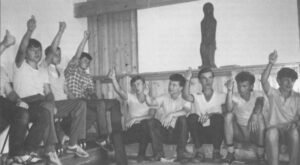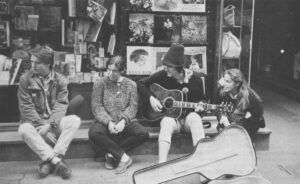Zofia Smardz
- 1986

Fellowship Title:
- Young generations of contemporary Eastern Europe
Fellowship Year:
- 1986
A Life of Limitations
EAST BERLIN–It was just going to be a short camping trip, only five days or so, but Wilfriede had been looking forward to it for months. In all her 21 years, she had never been outside East Germany, her farthest trip afield from the family enclave of East Berlin a visit to an aunt who lived in Dresden. Now she and four friends were going to Czechoslovakia to hike in the hills and spend a day or two in Prague, a city that lured Wilfriede, an art history student, with its promise of untouched medieval and baroque treasures. As the day of departure approached, Wilfriede grew excited and strangely nervous. She wouldn’t let herself think or talk about the trip, fearful that her eagerness would somehow jinx it all. But her bags stood packed and ready in a corner of her room a full week before the vacation was to begin. On the bright Sunday morning when they were scheduled to leave, Wilfriede and her friends arrived at Schoenefeld Airport several hours ahead of their

The Crisis of Polish Drug Abuse
GLOSKOW, Poland–At the end of a dusty road just beyond this tired northern town sits a rambling white stucco house with faint architectural pretensions to grandeur. Like most things in Poland, the house and its surrounding five acres of farmland have seen better days: the peeling stucco walls could use a fresh coat of paint; most of the land has been overtaken by bushes and brambles, and long-unused pieces of farm equipment lie rusting and tangled in weeds. The place has only been saved from total ruin by a ragtag battalion of tenants who renovated the interior of the house and now share its cell-like rooms, run a communal kitchen, do some vegetable gardening and dairy farming on a small swath of land, and keep a tiny flock of sheep and a half-dozen hogs in the big brown barn out back. Tending the Sheep at Gloskow. Young, self-sufficient and resolute, unfailingly polite and affectionate with one another, they call to mind a hippies commune of the American ’60s, where love, peace and harmony with nature

The Post-Solidarity Generation
WARSAW–When Danuta Pawlik got engaged, she thought her worries were over, but in fact that was when they began. Up until then, she had been a cheerful 22-year-old, just finished school, fitted out with a diploma in foreign languages for business use, and full of big dreams about the future. Not too big, of course, for after all this was martial law Poland, and there were limitations. But she envisioned a decent job at a good salary with the Polish airline or travel agency for herself; her boyfriend, Michal, was going to have a wonderful job with the technical crew of a popular Polish rock band. They would marry, have an exciting life (by Polish standards), travel, and Michal would make “masses of money,” Danuta declared. Best of all, the frustrations of the present would disappear. There would be no more long nights walking the streets of Warsaw and embracing in the parks until two or three in the morning because everything was closed, they had no car, and they couldn’t go home to one

The Alienated Generation
When the young generation, free from the malevolent influence of the ‘old’, arises, everything will change….We must postpone our hopes to the remote future, to a time when the Center and every dependent state will supply its citizens with refrigerators and automobiles, with white bread and a handsome ration of butter. Maybe then, at least, they will be satisfied… – Czeslaw Milosz, The Captive Mind, 1953 In the TeePeeFive, a trendy wood-paneled bar, dark-haired Tina sits in a corner booth, puffing like a countess on a Benson and Hedges Light. Perfectly coifed and expertly made up, a Mediterranean beauty swathed in blue silk scarves and golden chains, she looks much older than her 19 years. Only her surroundings, and at the moment, her dialogue betray her. The electric strains of a Dire Straits song fill the air, her best friend Aneta bounces lightly in the seat beside her, and Tina launches busily into giving a visitor instructions on the local disco scene. “The best is Amadeus,” she says, in a tone that brooks no argument.
